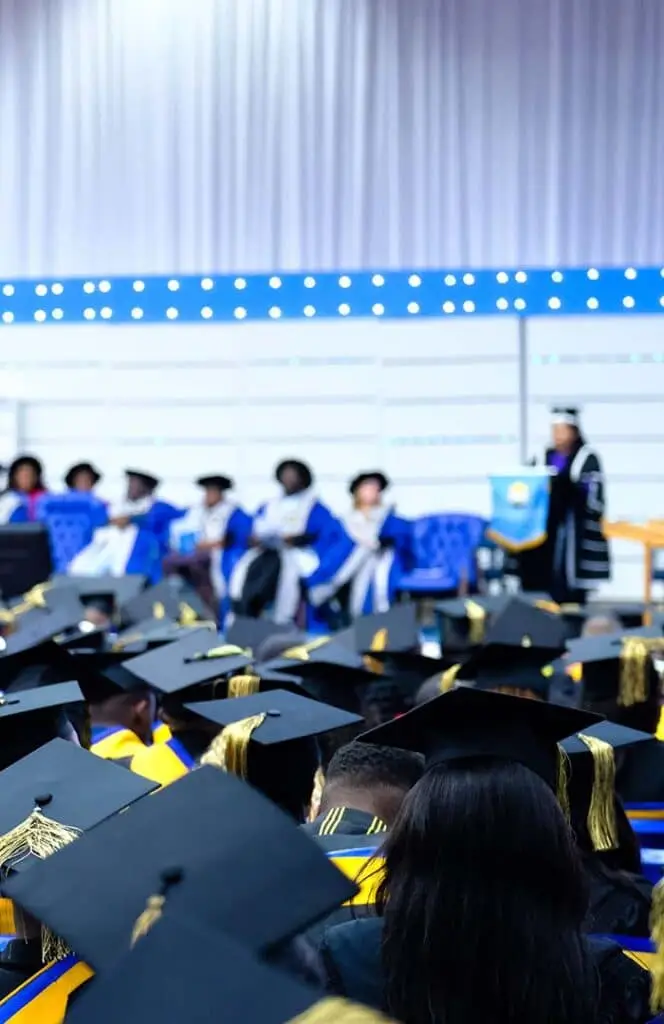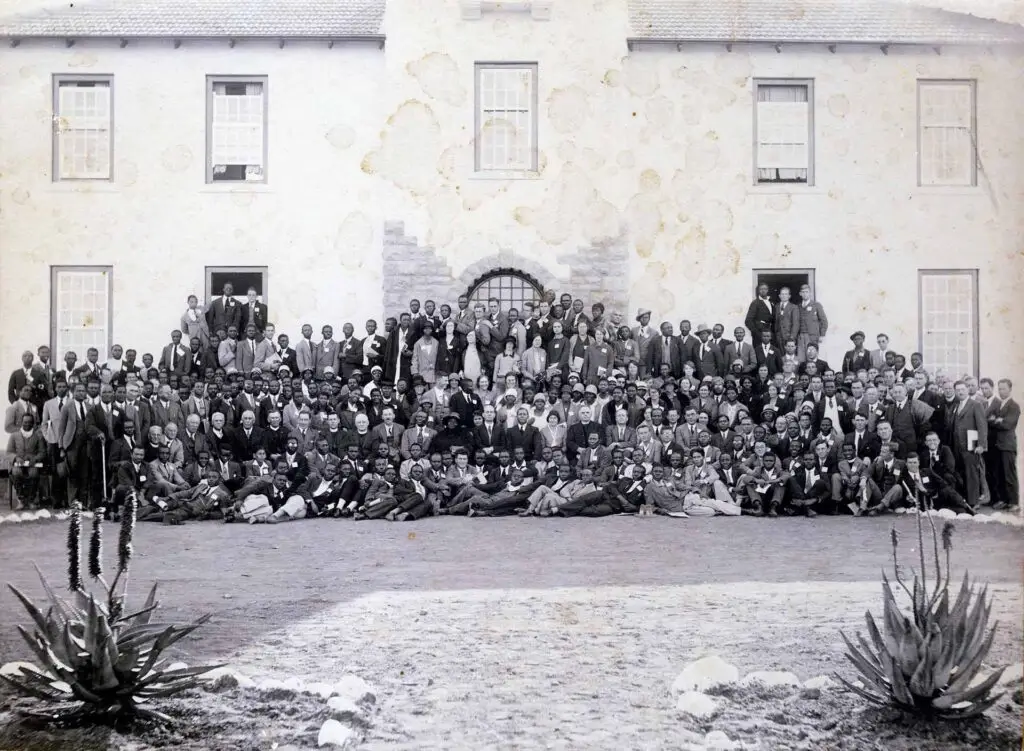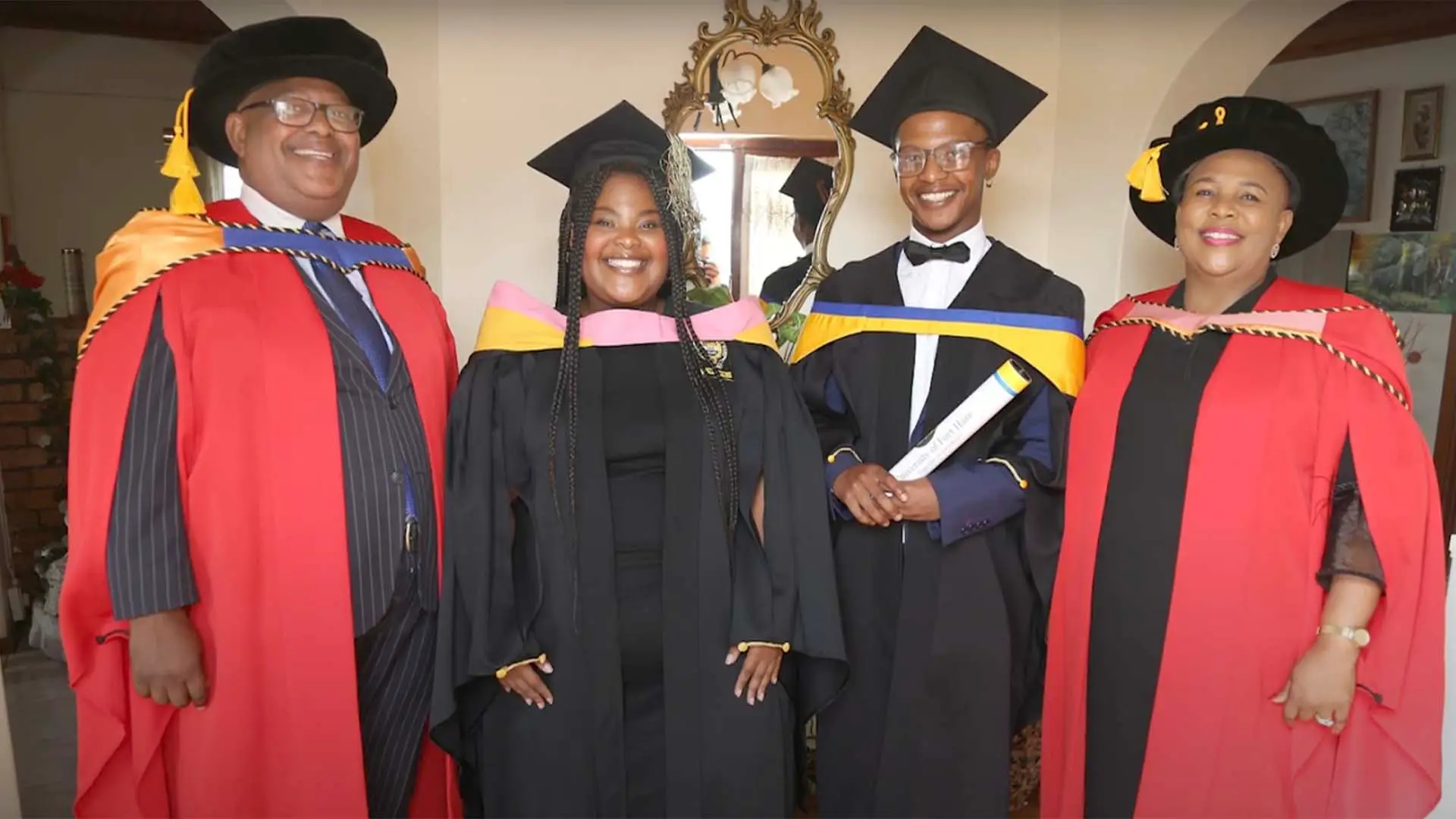UFH Alumni
Pioneers of Progress in Politics, Education, and Social Justice
Change makers of the future
Our Alumni are History-Makers and Flag Bearers of Change
University of Fort Hare (UFH) is immensely proud of our many alumni and friends who have shaped history, advanced society and significantly contributed to business, science, education, politics and promoting justice.
UFH has a history of nurturing inspirational leaders across Africa. It is exciting to see the University’s Centre for Leadership Ethics in Africa (CLEA) carrying this legacy forward, preparing the next generation of leaders to face the challenges of today’s world.
Although UFH provided the learning ground for formidable leaders who have brought about much-needed change in South Africa and across the African continent, many Fortharians continue to keep this legacy alive.
A current generation of leaders in politics, government, and the corporate world call Fort Hare their Alma Mater. Prominent figures include Sizwe Nxasana, Lazarus Zim, Kunene Brothers, Khaya Ngqula, Bulelani Ngcuka, Wendy Luhabe, Irvin Khoza, Tim Modise, Don Ncube, Former Premier of the Eastern Cape Rev Makhenkesi Stofile, Former KZN Premier Dr Frank Mdlalose, and so many more.
We acknowledge every former student and celebrate the pivotal role that UFH has played in shaping their education and character. Our Alumni, many of whom are trailblazers, stand as a testament to the transformative power of UFH’s education, inspiring hope and setting the stage for those who follow in their footsteps.

History and Purpose
Trailblazers Against Inequality Now Inspiring Tomorrow's Leaders
The history of the University of Fort Hare’s alumni is interconnected with the institution’s rich Legacy as a centre for African leadership, intellectualism, and resistance to oppression. UFH’s early alumni laid the foundation for Fort Hare’s reputation as a cradle of African leadership.
Since its founding in 1916, Fort Hare has produced many graduates who have gone on to become influential leaders, activists, intellectuals, and professionals across Africa and beyond. The alumni network reflects the University’s role as a breeding ground for leadership and social change, particularly in the fight against colonialism and apartheid.
Post-apartheid the alumni organisation has strengthened its ties with the University and is integral in supporting institutional growth, raising scholarship funds, and mentoring current students. Fort Hare alumni are now recognised for contributing to the development of the continent in broader fields beyond politics, including business, economics, health, social development and culture.
The University’s alumni have made significant contributions to African culture, education, and intellectualism, helping to shape modern African identity and thought. The alumni network plays a valuable role in inspiring new generations of students to pursue Excellence and leadership.

Our Goal
Mission & Objectives
Mission statement
The Alumni Relations Unit at the University of Fort Hare (UFH) plays a pivotal role in fostering a lifelong connection between the institution and its graduates. Its primary function is to engage and support UFH alumni through a variety of initiatives, including networking opportunities, career development programs, and social events. The unit serves as a bridge between past students and the university, ensuring that alumni remain involved in the university’s growth and success. By strengthening this relationship, the Alumni Relations Unit aims to create a thriving global network that benefits both the alumni community and UFH, advancing the institution’s mission and enhancing its impact in the wider world.
Our Objectives
Enlisting Alumni to Fuel Growth and Inspire Future Leaders
Through engagement with Fort Hare Alumni, UFH’s objective is to foster a lifelong relationship between the University of Fort Hare and its graduates and enlist Alumni to support the University’s commitment to Excellence.
The University aims to stimulate communication, networking, and collaboration by promoting opportunities for engagement. Alumni are encouraged to actively contribute to the University’s growth through mentorship, fundraising, and advocacy.
A key objective for UFH is to preserve its legacy and rich history through the contributions of Fort Hare’s alumni, highlighting their impact on African leadership, society, and development. Leveraging alumni’s accomplishments, UFH seeks to inspire and mentor current and future students, motivating them to achieve Excellence in their fields.

UFH Alumni Who Paved the Way for Progress and Equality
Nelson Mandela (Madiba), a name that needs no introduction, is a shining example of unyielding resilience and the power of moral leadership. His journey began at University of Fort Hare, where he studied towards a law degree. Although Madiba could not complete his degree at UFH, he became the first democratically elected president and father of the Rainbow Nation.
Nelson Mandela received more than 250 awards during his lifetime, the most notable being the Nobel Peace Prize in 2003. His profound impact on improving education, particularly for Black rural children, prompted the establishment of the Nelson Mandela Institute for Education and Rural Development at the UFH.
Even after stepping down from office, Mandela remained a guiding force in global humanitarian efforts, continuing to fight for the rights and dignity of people everywhere.
Nelson Mandela
Robert Gabriel Mugabe was a Zimbabwean revolutionary and politician who began his career as a school teacher before entering politics. Mugabe served as Prime Minister of Zimbabwe from 1980 to 1987 and then as President from 1987 to 2017. He was the leader of the Zimbabwe African National Union (ZANU) from 1975 to 1980 and led its successor political party, the Zanu-Patriotic Front, from 1980 to 2017.
Robert Mugabe
Julius Kambarage Nyerere, a UFH graduate, was a Tanzanian anti-colonial activist, politician and political theorist. He governed Tanganyika as prime minister from 1961 to 1962 and then as President from 1962 to 1964, after which he led its successor state, Tanzania, as President from 1964 to 1985.
Julius Kambarage Nyerere
Sir Seretse Goitsebeng Maphiri Khama was a Botswana politician who served as the country’s first President from 1966 to his death in 1980.
Khama led his country’s independence movement and helped facilitate the transition from British rule into an independent nation.
In 1962, he founded the Botswana Democratic Movement and became Prime Minister in 1965. In 1966, Botswana gained independence, and he was elected as its first president. During his presidency, the country underwent rapid economic growth and social progress.
Sir Seretse Goitsebeng Maphiri Khama
Ntsu Mokhehle was a Lesotho politician and former Fort Hare student. He founded the Basutoland African Congress (BAC) in 1952 and the Basutoland Congress Party in 1957. Later, in 1997, he founded the Lesotho Congress for Democracy (LCD). He was Lesotho’s third prime minister from 2 April 1993 to 17 August 1994 and then again from 14 September 1994 to 29 May 1998.
Mokhehle studied science at UFH and ultimately graduated with a Master of Science in Zoology after discovering several new species of parasites.
Ntsu Mokhehle
Not only did UFH Alumni Archibald make an impact on politics, but also in the arts and education. Campbell Mzolisa “A.C.” Jordan was a novelist, literary historian and intellectual pioneer of African studies in South Africa.Jordan was a renowned South African novelist, academic, and linguist.
He was lauded for his significant contributions to African literature and the study of indigenous African languages, particularly Xhosa. His most notable work is the Xhosa novel Ingqumbo Yeminyanya (The Wrath of the Ancestors), published in 1940.
Adding to his credentials is the work he did to develop and preserve the Xhosa language and ensure its formal study in South African academic institutions. He helped standardise the language through phonetics and grammar and became a lecturer at UFH, where he significantly contributed to academics through a program focused on African Intellectualism.
Archibald Campbell Jordan
Joshua Pulumo Mohapeloa was a prominent choral music composer, educator and ethnomusicologist in Sesotho, the national language of the Basotho people of Southern Africa. He played a significant role in blending traditional African music with Western music to create modern and innovative African choral music, composing over 100 works.
Mohapeloa was also a dedicated educator who spent much of his life teaching music and promoting music education in Lesotho and South Africa. He held various positions as a teacher and contributed to establishing music programs that emphasised the value of African music traditions alongside Western classical forms.
Joshua Pulomo Mohapeloa
Robert Sobuwe enrolled at UFH in 1947 and earned a Bachelor of Arts degree in 1949. Although Sobukwe was influential in the political arena as the founder of the Pan African Congress, he played a pivotal role in economic liberation. He fought for the rights of black business owners and ardently promoted entrepreneurship and economic empowerment.
Sobuwe advocated for black South Africans to have control over their own economic destinies and have the right to ownership of land, businesses, and resources. His ideology centred around Economic justice and has had a lasting impact on the face of business and Black economic empowerment.
Robert Sobukwe
UFH alumni continue to impact business and society; Fani Titi is an exemplary example. Titi is an internationally recognised businessman with over two decades of investment banking experience. He holds a BSc (cum laude) and BSc Hons (cum laude) in Mathematics from the University of Fort Hare.
Fani has been the Investec Group Chief Executive since March 2020 and is now the Chief Executive of the Investec Group (comprising the bank and wealth businesses globally). Fani is one of only two South African CEOs, alongside JSE CEO Leila Fourie, to sit on the Global Investors for Sustainable Development Alliance.
In addition to his business achievements, Titi is passionate about education and gender equality. Through his role at Investec, he is involved with many projects focused on improving Maths and Science education outcomes for learners from disadvantaged backgrounds.
Fani Titi
Make an Impact
Your support helps provide essential resources for scholarships, campus development, and student initiatives
Calendar
Events & Announcements
Alumni on the Move
#AlumniOnTheMove | Law Alumna appointed MD of Singapore Airlines GSA, Afro Asian Travel Services
Akona Mdlulwa, a University of Fort Hare (UFH) Law alumna, has earned her stripes as...
UFH Agriculture Economics Alumnus Wandile Sihlobo appointed to Presidential Economic Advisory Council
An esteemed alumnus of the University of Fort Hare (UFH), Wandile Sihlobo, Chief Economist of...
Looking to contact us?
Alumni Relations Office
